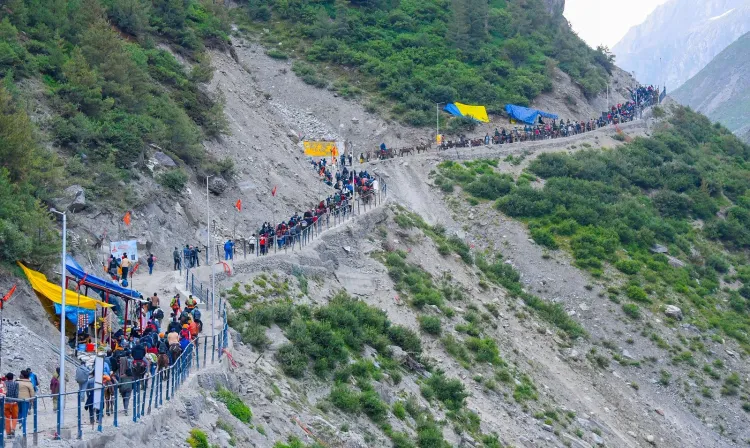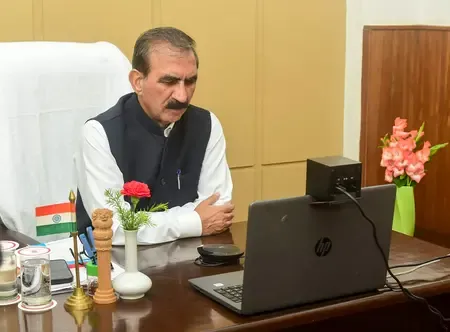Is the Amarnath Yatra a March of Faith and Resistance After the Pahalgam Attack?

Synopsis
Key Takeaways
- Amarnath Yatra symbolizes faith and resilience.
- Tribute to 26 lives lost in the Pahalgam attack.
- Indian security forces remain committed to protecting pilgrims.
- Majority of pilgrims opted for the Pahalgam route.
- Kashmir's economy is recovering post-Article 370 abrogation.
New Delhi, July 6 (NationPress) With thousands of devotees embarking on the challenging trek to the revered ice Shivalinga located at an altitude of 3,880 meters within the breathtaking Himalayan cave, each stride symbolizes more than just a spiritual journey -- it acts as a homage. A homage to the 26 innocent souls lost in the April 22 terrorist attack in Pahalgam, and a powerful statement of support for the Indian Armed Forces who protect this sacred route.
The atmosphere is charged with emotion as pilgrims convey their sincere appreciation to the Army and security forces dedicatedly working to ensure their safety. This is no minor undertaking. Supported by their Pakistani backers, terrorist organizations persist in their attempts to disrupt the peace in Jammu and Kashmir. Yet, India’s security forces have shown unwavering determination, thwarting every such effort with remarkable precision. India’s message has been clear.
The dismantling of nine terror camps in Pakistan and Pakistan-occupied Kashmir (PoK) has sent a strong signal -- restraint is no longer India's policy; Pakistan will face repercussions.
However, the Pakistani military establishment, which operates without checks and balances, continues to treat its leaders as mere pawns, relentlessly pursuing its misguided strategy of proxy warfare.
Driven by irrational perceptions, the Pakistan Army and its intelligence agency, the ISI, refuse to accept peace in Kashmir. Instead, they continue to propagate violence and turmoil.
As Operation Sindoor progresses, Pakistan-trained terrorists are again attempting to instigate unrest in Jammu and Kashmir. Since the April 22 attack, there have been at least seven significant encounters between terrorists and security forces.
On April 25, a clash erupted in the Bandipora district, resulting in the neutralization of Lashkar-e-Taiba (LeT) commander Altaf Lalli, with two policemen sustaining injuries.
On May 13, three terrorists, including prominent LeT commander Shahid Kuttay, were eliminated in Shopian's forests. On June 27, a Pakistan-trained terrorist associated with Jaish-e-Mohammad was killed in Basantgarh, Udhampur. Just a day prior to the Amarnath Yatra commencement, on July 2, another encounter occurred in Chatroo, Kishtwar. These operations highlight the extent of Pakistan's ongoing mischief, with sources and strategies stemming from the Pakistan Army-led establishment.
In a troubling address delivered on April 17, Pakistan Army Chief-turned-Field Marshal Asim Munir incited hatred, urging his populace to educate their children about the "stark differences between Hindus and Muslims". Five days later, Pakistan-backed terrorists executed a gruesome attack on tourists, claiming 25 lives after confirming their Hindu identities. A local Muslim pony-wala was the 26th victim.
Investigations by the National Investigation Agency (NIA) revealed that all three attackers were Pakistani nationals from the UN-designated LeT, assisted by local collaborators.
The J&K Police subsequently released sketches of the terrorists and apprehended two locals who provided them with shelter. This atrocious act constituted not merely an assault on civilians but also an attempt by Pakistan to incite communal discord throughout India and stifle Kashmir’s burgeoning prosperity. However, the scheme collapsed. Since the abrogation of Article 370 in 2019, Kashmir has experienced an economic resurgence. Last year, over two crore tourists visited the union territory. Business is thriving, infrastructure is advancing, and for the first time in decades, citizens are participating freely in parliamentary and Assembly elections. Pakistan’s narrative lies in tatters.
In stark contrast, Pakistan itself is on the verge of economic ruin. Its populace is protesting across PoK, and unrest is brewing in nearly every region of the nation.
The April 22 Pahalgam attack epitomized a defeated, frenzied power center in Pakistan that only knows how to instigate chaos and destruction in others' lives.
Pakistan represents a classic example of a failed psyche that resorts to destruction as it cannot seize what it desires. Nonetheless, the Kashmiris are largely foiling Pakistan's sinister plans now. The people have responded with clarity -- they reject Pakistan's toxic meddling and aspire for peace. They have warmly welcomed Amarnath Yatra devotees.
As pilgrims traverse the perilous path to Lord Shiva's sacred dwelling, their chants resonate across the mountains -- not solely in prayer, but in defiance.
Young worshippers sporting Operation Sindoor T-shirts rally in support of the Indian Armed Forces. Their determination, faith, and patriotism encapsulate the essence of a nation that refuses to back down.
Notably, the majority of this year's pilgrims have opted for the Pahalgam route -- not merely for its tradition, but as a conscious act of resilience and unity.
In the first three days alone, about 20,504 pilgrims chose this very path. This Yatra signifies not only a journey of faith -- it stands as a national proclamation. A declaration that India shall remain united against Pakistan's illegal aspirations, its fixation with terror, and its incessant efforts to disrupt Kashmir's tranquility.
(Deepika Bhan can be contacted at deepika.b@ians.in)










